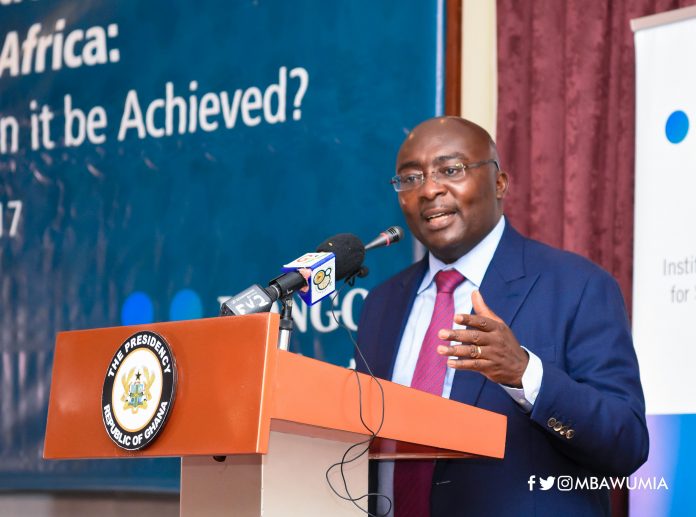Government will partner the private sector to achieve the UN Sustainable Development Goals (SDGs) and make the life of the ordinary Ghanaian better, Vice President Alhaji Dr Mahamudu Bawumia has stated.
According to Dr Bawumia, achieving the SDGs would benefit both the private sector, who would have a healthy, skilled work force, and Government which would have fulfilled its obligation to the citizenry to provide a safe, healthy and economically sound environment for growth.
“At the end of the day we have to ask the question: what is the opportunity cost of us not achieving the SDGs? We will have a lot of hunger, we will have a lot of poverty, we will have issues with sustainability of the environment, and so on. That picture of what would happen if we don’t achieve the SDGs makes it therefore very imperative, and in the interest of the private sector, that we do achieve the SDGs.”
The Vice President gave the assurance when he took part in a panel discussion on the topic “The Private Sector and SDGs” at the High Level African Roundtable on Mobilizing Support And Accelerating Implementation of the Sustainable Development Goals (SDGs) held in Accra on Tuesday December 12, 2017.
Dr Bawumia emphasised that Government was committed to achieving the UN goals, which include eliminating poverty and hunger; ensuring good health and well-being, quality education, gender equality; clean water and sanitation; and decent work and economic growth, among others as they would have a direct impact on her ability to meet the needs of the ordinary Ghanaian.
“Then we would have a more prosperous society, a more educated workforce and a healthier population and these are all necessary brickworks that would make the private sector do very well.
“If we achieve the SDGs it would mean that the necessary investments have been made, and those investments present a huge opportunity for private sector participation in national development.”
The Vice President indicated that government recognises the crucial role played by the private sector in achieving these goals, and would create the enabling environment for them to play their role in national development.
“The private sector is going to be very key because the type of resources we need to invest in achieving the SDG cannot be provided by the public sector alone; it is just not feasible. The public sector is going to be there as a partner, to make sure that the investment climate is therefore conducive for the private sector to participate.”
The Sustainable Development Goals (SDGs) were born at the United Nations Conference on Sustainable Development in Rio de Janeiro in 2012. The objective was to produce a set of universal goals that meet the urgent environmental, political and economic challenges facing our world.
The SDGs replace the Millennium Development Goals (MDGs), which started a global effort in 2000 to tackle the indignity of poverty. The MDGs established measurable, universally-agreed objectives for tackling extreme poverty and hunger, preventing deadly diseases, and expanding primary education to all children, among other development priorities.

